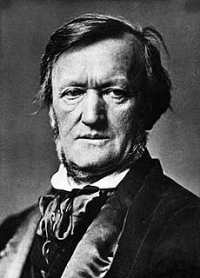Richard Wagner
 Wilhelm Richard Wagner (pronounced /'v?:?n?r/, German pronunciation: ; 22 May 1813 - 13 February 1883) was a German composer, conductor, theatre director and essayist, primarily known for his operas (or "music dramas", as they were later called). Wagner's compositions, particularly those of his later period, are notable for their complex texture, rich harmonies and orchestration, and the elaborate use of leitmotifs: musical themes associated with individual characters, places, ideas or plot elements. Unlike most other opera composers, Wagner wrote both the music and libretto for every one of his stage works. Famous extracts from his operas include the "Ride of the Valkyries" and the Bridal Chorus from Lohengrin, popularly known as the wedding march "Here Comes the Bride".
Wilhelm Richard Wagner (pronounced /'v?:?n?r/, German pronunciation: ; 22 May 1813 - 13 February 1883) was a German composer, conductor, theatre director and essayist, primarily known for his operas (or "music dramas", as they were later called). Wagner's compositions, particularly those of his later period, are notable for their complex texture, rich harmonies and orchestration, and the elaborate use of leitmotifs: musical themes associated with individual characters, places, ideas or plot elements. Unlike most other opera composers, Wagner wrote both the music and libretto for every one of his stage works. Famous extracts from his operas include the "Ride of the Valkyries" and the Bridal Chorus from Lohengrin, popularly known as the wedding march "Here Comes the Bride".Initially establishing his reputation as a composer of works such as The Flying Dutchman and Tannhauser which were in the romantic traditions of Weber and Meyerbeer, Wagner transformed operatic thought through his concept of the Gesamtkunstwerk ("total work of art"). This would achieve the synthesis of all the poetic, visual, musical and dramatic arts, and was announced in a series of essays between 1849 and 1852. Wagner realised this concept most fully in the first half of the monumental four-opera cycle Der Ring des Nibelungen. However, his thoughts on the relative importance of music and drama were to change again and he reintroduced some traditional operatic forms into his last few stage works including Die Meistersinger von Nurnberg.
Wagner pioneered advances in musical language, such as extreme chromaticism and quickly shifting tonal centres, which greatly influenced the development of European classical music. His Tristan und Isolde is sometimes described as marking the start of modern music. Wagner's influence spread beyond music into philosophy, literature, the visual arts and theatre. He had his own opera house built, the Bayreuth Festspielhaus, which contained many novel design features. It was here that the Ring and Parsifal received their premieres and where his most important stage works continue to be performed today in an annual festival run by his descendants. Wagner's views on conducting were also highly influential. His extensive writings on music, drama and politics have all attracted extensive comment; not least for their frequently antisemitic content.
Wagner achieved all of this despite a life characterised, until his last decades, by political exile, turbulent love affairs, poverty and repeated flight from his creditors. His pugnacious personality and often outspoken views on music, politics and society made him a controversial figure during his life. He has remained one to this day. The impact of his his ideas can be traced in many of the arts throughout the twentieth century.
 Richard Wagner Latest Sheets Feed
Richard Wagner Latest Sheets Feed Richard Wagner Latest Requests Feed
Richard Wagner Latest Requests Feed
Advertisement
Advertisement
Total 116 sheet(s) found, listing between 60 - 80.
| Song | Added By | Pages | Instruments | Sheet Type | File |
| Opera - Wagner - Lohengrin - Mein lieber Schwan! - Tenore |
DivoCarl (280)
5465d ago
|
5 | Piano, Vocal | Original |
|
| Rienzi Overture |
jo12991 (7)
5465d ago
|
40 | Cello, Trumpet, Violin, Clarinet, Flute, Viola, Horn, Bass, Trombone, Oboe, Timpani, Percussion | Original |
|
| Tristan and Izolda |
trezor (2)
5466d ago
|
7 | Piano | Original |
|
| Marcha nupcial |
merlin62 (25)
5467d ago
|
4 | Piano | Original |
|
| Tristan and Isolde overture |
klevdk (1)
5467d ago
|
5 | Piano | Transcription |
|
| Marche nuptiale de Lohengrin |
marcolucia (7)
5468d ago
|
1 | Piano | Original |
|
| Tristan und Isolde Vorspiel |
biggrunz (3)
5471d ago
|
17 | Cello, Clarinet, Horn | Original |
|
| dors, mon enfant |
lubuska (15)
5471d ago
|
4 | Piano, Vocal | Original |
|
| dors, mon enfant |
lubuska (15)
5471d ago
|
4 | Piano, Vocal | Original |
|
| Walkurenritt |
munerical (2)
5478d ago
|
8 | Piano | Original |
|
| Elsa's Procession to the Cathedral |
sarge111 (1)
5483d ago
|
10 | Flute | Transcription |
|
| Bruidmars |
martinmustra (20)
5486d ago
|
3 | Piano | Transcription |
|
| the evening star |
fernanda.dp94 (10)
5488d ago
|
1 | Piano | Book |
|
| Bridal March |
twinklestar1 (4)
5491d ago
|
1 | Violin | Other |
|
| Bruidmars |
stucky (11)
5493d ago
|
3 | Piano | Transcription |
|
| Ride of Walkyries |
avilys (1)
5503d ago
|
6 | Piano | Original |
|
| Evening Star |
synaptic (23)
5506d ago
|
1 | Violin | Original |
|
| L`Attente |
odilia (26)
5508d ago
|
6 | Piano, Vocal | Original |
|
| Brautchor Lohengrin |
Snowwhite (2)
5513d ago
|
2 | Piano, Vocal | Transcription |
|
| Brautlied aus Lohengrin |
opiumopi (2)
5516d ago
|
2 | Piano | Original |
|

